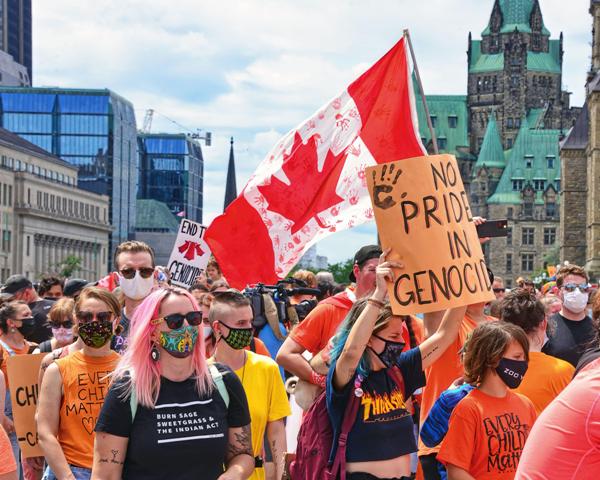 Ottawa, Canada - July 1, 2021: Thousands marched in the Cancel Canada Day march which ended up with a rally on Parliament Hill. They believe it is not proper to celebrate Canada Day in light of the recent discovery of unmarked graves on residential school grounds. [photo: Alamy]
Ottawa, Canada - July 1, 2021: Thousands marched in the Cancel Canada Day march which ended up with a rally on Parliament Hill. They believe it is not proper to celebrate Canada Day in light of the recent discovery of unmarked graves on residential school grounds. [photo: Alamy]
As the number of Indigenous children’s unmarked graves discovered at former residential schools in Canada passes 1,300, the country has been forced to confront one of the darkest parts of its history.
The grim finds began in May when the Tk’emlúps te Secwépemc First Nation found the remains of 215 Indigenous children who had died at Kamloops Indian residential school in British Columbia, run by the Catholic church from 1890 until it closed in 1978. In Saskatchewan the Cowessess First Nation found 751 unmarked graves at the Marieval school; 182 graves were found at St Eugene school, Cranbrook, by the Lower Kootenay band; and more than 160 were found by the Penelakut tribe at Kuper Island school, Vancouver Island.
Amid calls for the Canadian government to release attendance records to help identify unmarked graves at all 139 official residential schools, it was suggested by Murray Sinclair, the Indigenous judge who chaired the Truth and Reconciliation Commission (TRC), that the true figure ‘could be in the 15-25,000 range, and maybe even more’. It is the latest stage of Canada’s gradual recognition of what the prime minister, Justin Trudeau, called the ‘shameful policy that stole Indigenous children from their communities’. In 1907, Duncan Campbell Scott, a senior official in Canada’s Department of Indian Affairs, described this policy as ‘geared towards a Final Solution of our Indian Problem’.
The TRC’s landmark 2015 report called it ‘cultural genocide’ after hearing seven years of harrowing testimony: accounts of children of six being woken in the night to dig holes to bury fellow pupils; routine rape, sexual and physical abuse by priests and nuns; experiments in which children were deprived of nutrients and dental care; infants grabbed from their parents’ arms and taken away, often never to be seen again. The TRC report concluded that children being ‘kidnapped’ and taken to the schools, their forced conversion to Christianity, and the ban on speaking native languages were all part of ‘a coherent policy to eliminate Aboriginal people as distinct peoples … The Canadian government pursued this policy of cultural genocide because it wished to divest itself of its legal and financial obligations to Aboriginal people and gain control over their land and resources.’
As more graves were discovered, Catholic churches were burned down in British Columbia and colonial statues toppled. The First Nations group Idle No More sought to ‘cancel Canada Day’, the celebration on 1 July of the country’s foundation in 1867, and acknowledge Indigenous sovereignty. There were calls for a reckoning by Britain of its responsibilities as the colonial power. It is a legacy of forced sterilisations, inferior healthcare and higher rates of disease, poor water quality and housing, over-representation in prisons, and the disappearance and murder of thousands of Indigenous woman and girls. ‘Canadians rarely acknowledge the administrative control, appropriation of lands and resources, restriction of nearly every facet of Indigenous existence, including the right to define oneself, as a form of violence,’ the historian Susan Neylan noted in 2018.
As Michael Wernick, former head of Canada’s civil service, said: ‘We quietly care about our brand and reputation. But this year, Canadians have been jolted and had their views deeply challenged.’ But he was hopeful that ‘there may be a window, however long or brief, to channel this energy into real structural reforms’. There are some encouraging signs, such as the appointment of Mary Simon as Canada’s first Indigenous governor-general (though her inability to speak French angered some in francophone communities).
But for many members of First Nations, it is not enough. ‘Canadian representatives will offer flowery speeches about reconciliation with Indigenous peoples, while maintaining us in conditions that – to quote a lawyer who reviewed the schools in 1907 – are in “uncomfortable nearness with the charge of manslaughter”,’ Cindy Blackstock and Pamela Palmater wrote in the Guardian. ‘We need the international community to push Canada to end these historical and ongoing injustices. It can – but it has so far chosen not to.’



